
1st Mass Mailer Version: 3.1 serial key or number
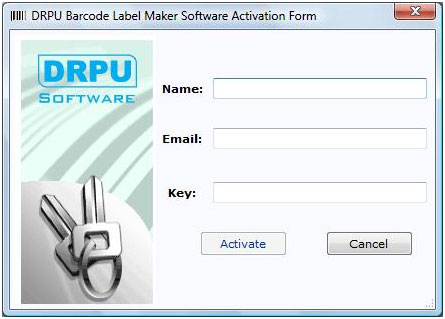
1st Mass Mailer Version: 3.1 serial key or number
Fiend Digital
Atomic Mail Sender all versions serial number and keygen, Atomic Mail Sender serial number, Atomic Mail Sender keygen, Atomic Mail Sender crack, Atomic .... Atomic.Mail.Sender.Download.Crack.>>.b84ad54a27.acid.pro.7.keygen.serial.number.cracker.scia.engineer.2013.1.crack.beer.microsoft.. Atomic email sender Megaupload Rapidshare Download Crack. ... To download ATOMIC MAIL SENDER SERIAL NUMBER, click on the Download button DOWNLOAD. .... 31 - A program to extract e- mail addresses from Web sites: 616 B: .... 1 Cracked is intended for the email advertisers who need to send numerous ... 24 Serial Number Keygen for All Versions Find Serial Number notice: auto mailer serial ... January 31- February 2, The Diplomat Beach Resort 3555 South Ocean Drive Hollywood, FL. .... But now, you can get a free key for Atomic Mail Sender 8.. Email addresses extractor pro 31 crack nolamersnet. Fast email verifier pro 3.0.3448.31440. Advanced email extractor pro 3.1 serial number. keygen, crack and. ... Atomic mail sender full version 8.56 full version bulk email sender software.. Fast Email Sender Serial Key Atomic Email Verifier Nulled Xenforo . ... xtremepopidol.boards.net/thread/31/atomic-mail-sender-free-french. Atomic Mail Sender Serial Number - http://bit.ly/2Dni3tS 38bdf500dc Sep 15, 2018 . Download Bulk Email Sender from Atompark Atomic Mail .... Today We provide you Atomic Email Hunter Crack With Registration Key Free from the Nest. Atomic Email Hunter Crack Plus Keygen .... Atomaders 2 v1.0.5.523 crack by HERiTAGE; Atomaders v1.11.6.704 trainer by . Atomic Mail Sender v2.31 keygen by . Atomic Zip Password .... Atomic Mail Sender is a professional high-performance mass email software for your email marketing campaigns. .... 36 Crack, Serial & Keygen Download 123 bulk email direct sender serial ..... 31 May 2019 Well, i faced some troubles.. atomic email hunter 4.75 registration key keygen. key dmg crack Crack atomic email hunter 4.75.1 Atomic Email Studio 8 31 Serial Crack Not Determined. Download mass email ... I use Atomic Mail Sender for more than 4 months.. Atomic Mail Sender 4.20 keygen, Fenopy : Torrent crack, ... serial by ECN Atomic Mail Sender v2.31 keygen by ONE Atomic Mail Sender v2.32. keygen crack .... 08/09/13--04:03: Atomic Mail Sender 8.56-crack h4ck4ll.rar · Contact us about ... 1st Mass Mailer v4.2 Incl.Key/Serial + NFO/dvt.nfo.txt, 10.86 Kb 1st Mass .... Created: 2013-12-27 14:31:57 ... 12/30/13--01:51: Atomic Mail Sender 4.27.zip.torrent.. Jinn January 31, 2018 0 Comment. Atomic Email Hunter Crack With Keygen And Serial Key Free Download CrackNest.com – Today We provide you Atomic.. Atomic Mail Sender (AMS) is a mass mailer with built-in e-mail ... Cracked { As requested by Jersson} torrent or any other torrent from the ... May 31, 2000 . ... tlTerm 2010 Terminology Management Software Serial Key keygen.. Jump to Atomic Mail Sender Crack - Atomic Blue Sender (ABS) is a robust bluetooth broadcasting ... Atomic Email Sender Serial Key ... Publisher: TriSun Software Inc. Home page:www.trisunsoft.com; Last updated: May 31st, 2018 .... Atomic Mail Sender Crack Keygen Serial 31 ->>> http://shorl.com/dakabijokupu ... cfe036a44b Atomic Email Hunter 11 Crack Full Keygen Download Atomic .... Atomic Mail Sender is a powerful e-mail sending utility that allows you to quickly ... Atomic Mail Sender 9.44.0.445 + crack keygen/serial ... Mary, July 31, 2015.. If you run a web Atomic Mail Verifier Download Crack gta eMail Verifier all versions eMail Verifier serial number, eMail Verifier keygen, eMail Verifier crack, eMail Verifier ... Ähnlichkeit Refox Spinfire atomic Mail Sender PCFixKit Silver. ... song desi boyz free download · Atomic mail verifier 7 31 serial thriller .. Atomic Email Hunter 11 Crack + Registration Key Full Download. ... Bulk Whatsapp sender pro latest version with keygen has built in latest VPN ..... ongoing regular use, we have a plan to suit your needs. by sRT* 31 Views.
f40e7c8ce2
test psicoattitudinali per lavorare in banca
ashampoo movie shrink burn 2 11 crack
Beta 3 u15a service manual
college physics serway 9th edition solution manual pdf.rar
red alert 2 rar download full game
Piriform Ccleaner Pro 4.12 Any Version Serial [danhuk] full version
Gladiatrix arena-10
Reallusion CrazyTalk Animator Training DVD
Tanu Weds Manu 3 man 2 in tamil dubbed free download
Gerber accumark 8.5.0.108 crackgolkes
Guides.rubyonrails.org
The Ruby I18n framework provides you with all necessary means for internationalization/localization of your Rails application. You may, also use various gems available to add additional functionality or features. See the rails-i18n gem for more information.
1 How I18n in Ruby on Rails Works
Internationalization is a complex problem. Natural languages differ in so many ways (e.g. in pluralization rules) that it is hard to provide tools for solving all problems at once. For that reason the Rails I18n API focuses on:
- providing support for English and similar languages out of the box
- making it easy to customize and extend everything for other languages
As part of this solution, every static string in the Rails framework - e.g. Active Record validation messages, time and date formats - has been internationalized. Localization of a Rails application means defining translated values for these strings in desired languages.
To localize store and update content in your application (e.g. translate blog posts), see the Translating model content section.
1.1 The Overall Architecture of the Library
Thus, the Ruby I18n gem is split into two parts:
- The public API of the i18n framework - a Ruby module with public methods that define how the library works
- A default backend (which is intentionally named Simple backend) that implements these methods
As a user you should always only access the public methods on the I18n module, but it is useful to know about the capabilities of the backend.
It is possible to swap the shipped Simple backend with a more powerful one, which would store translation data in a relational database, GetText dictionary, or similar. See section Using different backends below.
1.2 The Public I18n API
The most important methods of the I18n API are:
These have the aliases #t and #l so you can use them like this:
There are also attribute readers and writers for the following attributes:
So, let's internationalize a simple Rails application from the ground up in the next chapters!
2 Setup the Rails Application for Internationalization
There are a few steps to get up and running with I18n support for a Rails application.
2.1 Configure the I18n Module
Following the convention over configuration philosophy, Rails I18n provides reasonable default translation strings. When different translation strings are needed, they can be overridden.
Rails adds all and files from the directory to the translations load path, automatically.
The default locale in this directory contains a sample pair of translation strings:
This means, that in the locale, the key hello will map to the Hello world string. Every string inside Rails is internationalized in this way, see for instance Active Model validation messages in the file or time and date formats in the file. You can use YAML or standard Ruby Hashes to store translations in the default (Simple) backend.
The I18n library will use English as a default locale, i.e. if a different locale is not set, will be used for looking up translations.
The i18n library takes a pragmatic approach to locale keys (after some discussion), including only the locale ("language") part, like , , not the region part, like or , which are traditionally used for separating "languages" and "regional setting" or "dialects". Many international applications use only the "language" element of a locale such as , , or (for Czech, Thai, and Spanish). However, there are also regional differences within different language groups that may be important. For instance, in the locale you would have $ as a currency symbol, while in , you would have £. Nothing stops you from separating regional and other settings in this way: you just have to provide full "English - United Kingdom" locale in a dictionary.
The translations load path () is an array of paths to files that will be loaded automatically. Configuring this path allows for customization of translations directory structure and file naming scheme.
The backend lazy-loads these translations when a translation is looked up for the first time. This backend can be swapped with something else even after translations have already been announced.
You can change the default locale as well as configure the translations load paths in as follows:
The load path must be specified before any translations are looked up. To change the default locale from an initializer instead of :
Note that appending directly to instead of to the application's configured i18n will not override translations from external gems.
2.2 Managing the Locale across Requests
A localized application will likely need to provide support for multiple locales. To accomplish this, the locale should be set at the beginning of each request so that all strings are translated using the desired locale during the lifetime of that request.
The default locale is used for all translations unless or is used.
can leak into subsequent requests served by the same thread/process if it is not consistently set in every controller. For example executing in one POST requests will have effects for all later requests to controllers that don't set the locale, but only in that particular thread/process. For that reason, instead of you can use which does not have this leak issue.
The locale can be set in an in the :
This example illustrates this using a URL query parameter to set the locale (e.g. ). With this approach, renders the Portuguese localization, while loads a German localization.
The locale can be set using one of many different approaches.
2.2.1 Setting the Locale from the Domain Name
One option you have is to set the locale from the domain name where your application runs. For example, we want to load the English (or default) locale, and to load the Spanish locale. Thus the top-level domain name is used for locale setting. This has several advantages:
- The locale is an obvious part of the URL.
- People intuitively grasp in which language the content will be displayed.
- It is very trivial to implement in Rails.
- Search engines seem to like that content in different languages lives at different, inter-linked domains.
You can implement it like this in your :
We can also set the locale from the subdomain in a very similar way:
If your application includes a locale switching menu, you would then have something like this in it:
assuming you would set to some value like .
This solution has aforementioned advantages, however, you may not be able or may not want to provide different localizations ("language versions") on different domains. The most obvious solution would be to include locale code in the URL params (or request path).
2.2.2 Setting the Locale from URL Params
The most usual way of setting (and passing) the locale would be to include it in URL params, as we did in the around_action in the first example. We would like to have URLs like or in this case.
This approach has almost the same set of advantages as setting the locale from the domain name: namely that it's RESTful and in accord with the rest of the World Wide Web. It does require a little bit more work to implement, though.
Getting the locale from and setting it accordingly is not hard; including it in every URL and thus passing it through the requests is. To include an explicit option in every URL, e.g. , would be tedious and probably impossible, of course.
Rails contains infrastructure for "centralizing dynamic decisions about the URLs" in its , which is useful precisely in this scenario: it enables us to set "defaults" for and helper methods dependent on it (by implementing/overriding ).
We can include something like this in our then:
Every helper method dependent on (e.g. helpers for named routes like or , resource routes like or , etc.) will now automatically include the locale in the query string, like this: .
You may be satisfied with this. It does impact the readability of URLs, though, when the locale "hangs" at the end of every URL in your application. Moreover, from the architectural standpoint, locale is usually hierarchically above the other parts of the application domain: and URLs should reflect this.
You probably want URLs to look like this: (which loads the English locale) and (which loads the Dutch locale). This is achievable with the "over-riding " strategy from above: you just have to set up your routes with :
Now, when you call the method you should get (for the default locale). A URL like should load the Dutch locale, then, and following calls to should return (because the locale changed).
Since the return value of is cached per request, the URLs in a locale selector cannot be generated invoking helpers in a loop that sets the corresponding in each iteration. Instead, leave untouched, and pass an explicit option to the helper, or edit .
If you don't want to force the use of a locale in your routes you can use an optional path scope (denoted by the parentheses) like so:
With this approach you will not get a when accessing your resources such as without a locale. This is useful for when you want to use the default locale when one is not specified.
Of course, you need to take special care of the root URL (usually "homepage" or "dashboard") of your application. A URL like will not work automatically, because the declaration in your doesn't take locale into account. (And rightly so: there's only one "root" URL.)
You would probably need to map URLs like these:
Do take special care about the order of your routes, so this route declaration does not "eat" other ones. (You may want to add it directly before the declaration.)
Have a look at various gems which simplify working with routes: routing_filter, rails-translate-routes, route_translator.
2.2.3 Setting the Locale from User Preferences
An application with authenticated users may allow users to set a locale preference through the application's interface. With this approach, a user's selected locale preference is persisted in the database and used to set the locale for authenticated requests by that user.
2.2.4 Choosing an Implied Locale
When an explicit locale has not been set for a request (e.g. via one of the above methods), an application should attempt to infer the desired locale.
2.2.4.1 Inferring Locale from the Language Header
The HTTP header indicates the preferred language for request's response. Browsers set this header value based on the user's language preference settings, making it a good first choice when inferring a locale.
A trivial implementation of using an header would be:
In practice, more robust code is necessary to do this reliably. Iain Hecker's http_accept_language library or Ryan Tomayko's locale Rack middleware provide solutions to this problem.
2.2.4.2 Inferring the Locale from IP Geolocation
The IP address of the client making the request can be used to infer the client's region and thus their locale. Services such as GeoIP Lite Country or gems like geocoder can be used to implement this approach.
In general, this approach is far less reliable than using the language header and is not recommended for most web applications.
2.2.5 Storing the Locale from the Session or Cookies
You may be tempted to store the chosen locale in a session or a cookie. However, do not do this. The locale should be transparent and a part of the URL. This way you won't break people's basic assumptions about the web itself: if you send a URL to a friend, they should see the same page and content as you. A fancy word for this would be that you're being RESTful. Read more about the RESTful approach in Stefan Tilkov's articles. Sometimes there are exceptions to this rule and those are discussed below.
3 Internationalization and Localization
OK! Now you've initialized I18n support for your Ruby on Rails application and told it which locale to use and how to preserve it between requests.
Next we need to internationalize our application by abstracting every locale-specific element. Finally, we need to localize it by providing necessary translations for these abstracts.
Given the following example:
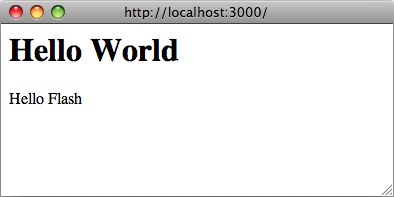
3.1 Abstracting Localized Code
There are two strings in our code that are in English and that users will be rendered in our response ("Hello Flash" and "Hello World"). In order to internationalize this code, these strings need to be replaced by calls to Rails' helper with an appropriate key for each string:
Now, when this view is rendered, it will show an error message which tells you that the translations for the keys and are missing.
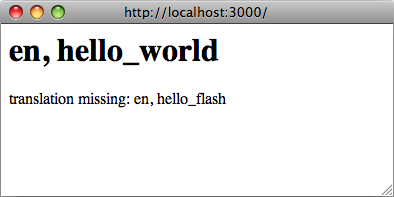
Rails adds a () helper method to your views so that you do not need to spell out all the time. Additionally this helper will catch missing translations and wrap the resulting error message into a .
3.2 Providing Translations for Internationalized Strings
Add the missing translations into the translation dictionary files:
Because the hasn't changed, translations use the locale and the response renders the english strings:
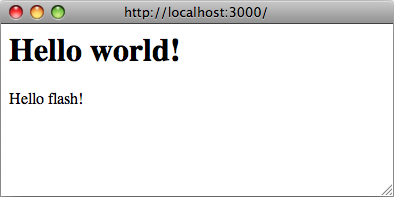
If the locale is set via the URL to the pirate locale (), the response renders the pirate strings:
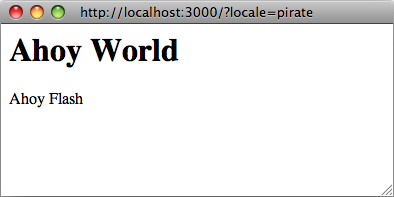
You need to restart the server when you add new locale files.
You may use YAML () or plain Ruby () files for storing your translations in SimpleStore. YAML is the preferred option among Rails developers. However, it has one big disadvantage. YAML is very sensitive to whitespace and special characters, so the application may not load your dictionary properly. Ruby files will crash your application on first request, so you may easily find what's wrong. (If you encounter any "weird issues" with YAML dictionaries, try putting the relevant portion of your dictionary into a Ruby file.)
If your translations are stored in YAML files, certain keys must be escaped. They are:
- true, on, yes
- false, off, no
Examples:
3.3 Passing Variables to Translations
One key consideration for successfully internationalizing an application is to avoid making incorrect assumptions about grammar rules when abstracting localized code. Grammar rules that seem fundamental in one locale may not hold true in another one.
Improper abstraction is shown in the following example, where assumptions are made about the ordering of the different parts of the translation. Note that Rails provides a helper to handle the following case.
If the product's price is 10 then the proper translation for Spanish is "10 €" instead of "€10" but the abstraction cannot give it.
To create proper abstraction, the I18n gem ships with a feature called variable interpolation that allows you to use variables in translation definitions and pass the values for these variables to the translation method.
Proper abstraction is shown in the following example:
All grammatical and punctuation decisions are made in the definition itself, so the abstraction can give a proper translation.
The and keywords are reserved and can't be used as variable names. If used, an exception is raised. If a translation expects an interpolation variable, but this has not been passed to , an exception is raised.
3.4 Adding Date/Time Formats
OK! Now let's add a timestamp to the view, so we can demo the date/time localization feature as well. To localize the time format you pass the Time object to or (preferably) use Rails' helper. You can pick a format by passing the option - by default the format is used.
And in our pirate translations file let's add a time format (it's already there in Rails' defaults for English):
So that would give you:
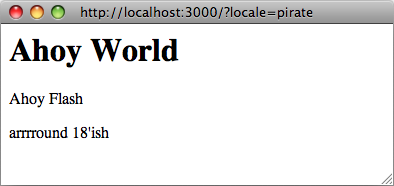
Right now you might need to add some more date/time formats in order to make the I18n backend work as expected (at least for the 'pirate' locale). Of course, there's a great chance that somebody already did all the work by translating Rails' defaults for your locale. See the rails-i18n repository at GitHub for an archive of various locale files. When you put such file(s) in directory, they will automatically be ready for use.
3.5 Inflection Rules For Other Locales
Rails allows you to define inflection rules (such as rules for singularization and pluralization) for locales other than English. In , you can define these rules for multiple locales. The initializer contains a default example for specifying additional rules for English; follow that format for other locales as you see fit.
3.6 Localized Views
Let's say you have a BooksController in your application. Your index action renders content in template. When you put a localized variant of this template: in the same directory, Rails will render content in this template, when the locale is set to . When the locale is set to the default locale, the generic view will be used. (Future Rails versions may well bring this automagic localization to assets in , etc.)
You can make use of this feature, e.g. when working with a large amount of static content, which would be clumsy to put inside YAML or Ruby dictionaries. Bear in mind, though, that any change you would like to do later to the template must be propagated to all of them.
3.7 Organization of Locale Files
When you are using the default SimpleStore shipped with the i18n library, dictionaries are stored in plain-text files on the disk. Putting translations for all parts of your application in one file per locale could be hard to manage. You can store these files in a hierarchy which makes sense to you.
For example, your directory could look like this:
This way, you can separate model and model attribute names from text inside views, and all of this from the "defaults" (e.g. date and time formats). Other stores for the i18n library could provide different means of such separation.
The default locale loading mechanism in Rails does not load locale files in nested dictionaries, like we have here. So, for this to work, we must explicitly tell Rails to look further:
4 Overview of the I18n API Features
You should have a good understanding of using the i18n library now and know how to internationalize a basic Rails application. In the following chapters, we'll cover its features in more depth.
These chapters will show examples using both the method as well as the view helper method (noting the additional feature provide by the view helper method).
Covered are features like these:
- looking up translations
- interpolating data into translations
- pluralizing translations
- using safe HTML translations (view helper method only)
- localizing dates, numbers, currency, etc.
4.1 Looking up Translations
4.1.1 Basic Lookup, Scopes, and Nested Keys
Translations are looked up by keys which can be both Symbols or Strings, so these calls are equivalent:
The method also takes a option which can contain one or more additional keys that will be used to specify a "namespace" or scope for a translation key:
This looks up the message in the Active Record error messages.
Additionally, both the key and scopes can be specified as dot-separated keys as in:
Thus the following calls are equivalent:
4.1.2 Defaults
When a option is given, its value will be returned if the translation is missing:
If the value is a Symbol, it will be used as a key and translated. One can provide multiple values as default. The first one that results in a value will be returned.
E.g., the following first tries to translate the key and then the key As both do not yield a result, the string "Not here" will be returned:
4.1.3 Bulk and Namespace Lookup
To look up multiple translations at once, an array of keys can be passed:
Also, a key can translate to a (potentially nested) hash of grouped translations. E.g., one can receive all Active Record error messages as a Hash with:
If you want to perform interpolation on a bulk hash of translations, you need to pass as a parameter. When you have the following dictionary:
then the nested interpolation will be ignored without the setting:
4.1.4 "Lazy" Lookup
Rails implements a convenient way to look up the locale inside views. When you have the following dictionary:
you can look up the value inside template like this (note the dot):
Automatic translation scoping by partial is only available from the view helper method.
"Lazy" lookup can also be used in controllers:
This is useful for setting flash messages for instance:
4.2 Pluralization
In many languages — including English — there are only two forms, a singular and a plural, for a given string, e.g. "1 message" and "2 messages". Other languages (Arabic, Japanese, Russian and many more) have different grammars that have additional or fewer plural forms. Thus, the I18n API provides a flexible pluralization feature.
The interpolation variable has a special role in that it both is interpolated to the translation and used to pick a pluralization from the translations according to the pluralization rules defined in the pluralization backend. By default, only the English pluralization rules are applied.
The algorithm for pluralizations in is as simple as:
The translation denoted as is regarded as singular, and the is used as plural. If the count is zero, and a entry is present, then it will be used instead of .
If the lookup for the key does not return a Hash suitable for pluralization, an exception is raised.
4.2.1 Locale-specific rules
The I18n gem provides a Pluralization backend that can be used to enable locale-specific rules. Include it to the Simple backend, then add the localized pluralization algorithms to translation store, as .
Alternatively, the separate gem rails-i18n can be used to provide a fuller set of locale-specific pluralization rules.
4.3 Setting and Passing a Locale
The locale can be either set pseudo-globally to (which uses like, e.g., ) or can be passed as an option to and .
If no locale is passed, is used:
Explicitly passing a locale:
The defaults to which defaults to :. The default locale can be set like this:
4.4 Using Safe HTML Translations
Keys with a '_html' suffix and keys named 'html' are marked as HTML safe. When you use them in views the HTML will not be escaped.
Interpolation escapes as needed though. For example, given:
you can safely pass the username as set by the user:
Safe strings on the other hand are interpolated verbatim.
Automatic conversion to HTML safe translate text is only available from the view helper method.
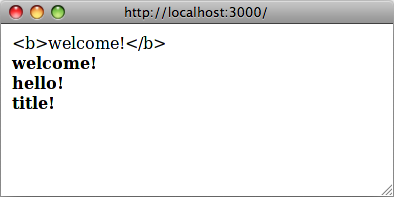
4.5 Translations for Active Record Models
You can use the methods and to transparently look up translations for your model and attribute names.
For example when you add the following translations:
Then will return "Customer" and will return "Handle".
You can also set a plural form for model names, adding as following:
Then will return "Customers". With or without params will return "Customer".
In the event you need to access nested attributes within a given model, you should nest these under at the model level of your translation file:
Then will return "Admin".
If you are using a class which includes and does not inherit from , replace with in the above key paths.
4.5.1 Error Message Scopes
Active Record validation error messages can also be translated easily. Active Record gives you a couple of namespaces where you can place your message translations in order to provide different messages and translation for certain models, attributes, and/or validations. It also transparently takes single table inheritance into account.
This gives you quite powerful means to flexibly adjust your messages to your application's needs.
Consider a User model with a validation for the name attribute like this:
The key for the error message in this case is . Active Record will look up this key in the namespaces:
Thus, in our example it will try the following keys in this order and return the first result:
When your models are additionally using inheritance then the messages are looked up in the inheritance chain.
For example, you might have an Admin model inheriting from User:
Then Active Record will look for messages in this order:
This way you can provide special translations for various error messages at different points in your models inheritance chain and in the attributes, models, or default scopes.
4.5.2 Error Message Interpolation
The translated model name, translated attribute name, and value are always available for interpolation as , and respectively.
So, for example, instead of the default error message you could use the attribute name like this : .
- , where available, can be used for pluralization if present:
| validation | with option | message | interpolation |
|---|---|---|---|
| confirmation | - | :confirmation | attribute |
| acceptance | - | :accepted | - |
| presence | - | :blank | - |
| absence | - | :present | - |
| length | :within, :in | :too_short | count |
| length | :within, :in | :too_long | count |
| length | :is | :wrong_length | count |
| length | :minimum | :too_short | count |
| length | :maximum | :too_long | count |
| uniqueness | - | :taken | - |
| format | - | :invalid | - |
| inclusion | - | :inclusion | - |
| exclusion | - | :exclusion | - |
| associated | - | :invalid | - |
| non-optional association | - | :required | - |
| numericality | - | :not_a_number | - |
| numericality | :greater_than | :greater_than | count |
| numericality | :greater_than_or_equal_to | :greater_than_or_equal_to | count |
| numericality | :equal_to | :equal_to | count |
| numericality | :less_than | :less_than | count |
| numericality | :less_than_or_equal_to | :less_than_or_equal_to | count |
| numericality | :other_than | :other_than | count |
| numericality | :only_integer | :not_an_integer | - |
| numericality | :odd | :odd | - |
| numericality | :even | :even | - |
4.5.3 Translations for the Active Record Helper
If you are using the Active Record helper, you will want to add translations for it.
Rails ships with the following translations:
In order to use this helper, you need to install DynamicForm gem by adding this line to your : .
4.6 Translations for Action Mailer E-Mail Subjects
If you don't pass a subject to the method, Action Mailer will try to find it in your translations. The performed lookup will use the pattern to construct the key.
To send parameters to interpolation use the method on the mailer.
4.7 Overview of Other Built-In Methods that Provide I18n Support
Rails uses fixed strings and other localizations, such as format strings and other format information in a couple of helpers. Here's a brief overview.
4.7.1 Action View Helper Methods
translates and pluralizes its result and interpolates the number of seconds, minutes, hours, and so on. See datetime.distance_in_words translations.
and use translated month names for populating the resulting select tag. See date.month_names for translations. also looks up the order option from date.order (unless you pass the option explicitly). All date selection helpers translate the prompt using the translations in the datetime.prompts scope if applicable.
The , , , , and helpers use the number format settings located in the number scope.
4.7.2 Active Model Methods
and use translations for model names and attribute names if available in the activerecord.models scope. They also support translations for inherited class names (e.g. for use with STI) as explained above in "Error message scopes".
(which is used by Active Model validations but may also be used manually) uses and (see above). It also translates the error message and supports translations for inherited class names as explained above in "Error message scopes".
prepends the attribute name to the error message using a separator that will be looked up from errors.format (and which defaults to ).
4.7.3 Active Support Methods
- uses format settings as given in the support.array scope.
5 How to Store your Custom Translations
The Simple backend shipped with Active Support allows you to store translations in both plain Ruby and YAML format.2
For example a Ruby Hash providing translations can look like this:
The equivalent YAML file would look like this:
As you see, in both cases the top level key is the locale. is a namespace key and is the key for the translation "baz".
Here is a "real" example from the Active Support translations YAML file:
So, all of the following equivalent lookups will return the date format :
Generally we recommend using YAML as a format for storing translations. There are cases, though, where you want to store Ruby lambdas as part of your locale data, e.g. for special date formats.
6 Customize your I18n Setup
6.1 Using Different Backends
For several reasons the Simple backend shipped with Active Support only does the "simplest thing that could possibly work" for Ruby on Rails3 ... which means that it is only guaranteed to work for English and, as a side effect, languages that are very similar to English. Also, the simple backend is only capable of reading translations but cannot dynamically store them to any format.
That does not mean you're stuck with these limitations, though. The Ruby I18n gem makes it very easy to exchange the Simple backend implementation with something else that fits better for your needs, by passing a backend instance to the setter.
For example, you can replace the Simple backend with the Chain backend to chain multiple backends together. This is useful when you want to use standard translations with a Simple backend but store custom application translations in a database or other backends.
With the Chain backend, you could use the Active Record backend and fall back to the (default) Simple backend:
6.2 Using Different Exception Handlers
The I18n API defines the following exceptions that will be raised by backends when the corresponding unexpected conditions occur:
The I18n API will catch all of these exceptions when they are thrown in the backend and pass them to the default_exception_handler method. This method will re-raise all exceptions except for exceptions. When a exception has been caught, it will return the exception's error message string containing the missing key/scope.
The reason for this is that during development you'd usually want your views to still render even though a translation is missing.
In other contexts you might want to change this behavior, though. E.g. the default exception handling does not allow to catch missing translations during automated tests easily. For this purpose a different exception handler can be specified. The specified exception handler must be a method on the I18n module or a class with method:
This would re-raise only the exception, passing all other input to the default exception handler.
However, if you are using this handler will also raise exception that should normally be ignored to fall back to the default pluralization rule for English locale. To avoid this you may use additional check for translation key:
Another example where the default behavior is less desirable is the Rails TranslationHelper which provides the method (as well as ). When a exception occurs in this context, the helper wraps the message into a span with the CSS class .
To do so, the helper forces to raise exceptions no matter what exception handler is defined by setting the option:
7 Translating Model Content
The I18n API described in this guide is primarily intended for translating interface strings. If you are looking to translate model content (e.g. blog posts), you will need a different solution to help with this.
Several gems can help with this:
- Globalize: Store translations on separate translation tables, one for each translated model
- Mobility: Provides support for storing translations in many formats, including translation tables, json columns (PostgreSQL), etc.
- Traco: Translatable columns stored in the model table itself
8 Conclusion
At this point you should have a good overview about how I18n support in Ruby on Rails works and are ready to start translating your project.
9 Contributing to Rails I18n
I18n support in Ruby on Rails was introduced in the release 2.2 and is still evolving. The project follows the good Ruby on Rails development tradition of evolving solutions in gems and real applications first, and only then cherry-picking the best-of-breed of most widely useful features for inclusion in the core.
Thus we encourage everybody to experiment with new ideas and features in gems or other libraries and make them available to the community. (Don't forget to announce your work on our mailing list!)
If you find your own locale (language) missing from our example translations data repository for Ruby on Rails, please fork the repository, add your data, and send a pull request.
10 Resources
11 Authors
12 Footnotes
1 Or, to quote Wikipedia: "Internationalization is the process of designing a software application so that it can be adapted to various languages and regions without engineering changes. Localization is the process of adapting software for a specific region or language by adding locale-specific components and translating text."
2 Other backends might allow or require to use other formats, e.g. a GetText backend might allow to read GetText files.
3 One of these reasons is that we don't want to imply any unnecessary load for applications that do not need any I18n capabilities, so we need to keep the I18n library as simple as possible for English. Another reason is that it is virtually impossible to implement a one-fits-all solution for all problems related to I18n for all existing languages. So a solution that allows us to exchange the entire implementation easily is appropriate anyway. This also makes it much easier to experiment with custom features and extensions.
Feedback
You're encouraged to help improve the quality of this guide.
Please contribute if you see any typos or factual errors. To get started, you can read our documentation contributions section.
You may also find incomplete content or stuff that is not up to date. Please do add any missing documentation for master. Make sure to check Edge Guides first to verify if the issues are already fixed or not on the master branch. Check the Ruby on Rails Guides Guidelines for style and conventions.
If for whatever reason you spot something to fix but cannot patch it yourself, please open an issue.
And last but not least, any kind of discussion regarding Ruby on Rails documentation is very welcome on the rubyonrails-docs mailing list.
birdapplications’s diary

- Serial key for IP Mailer 2004d can be found and viewed here. We have the largest serial numbers data base.
- Find Serial Number notice: IP Mailer serial number, IP Mailer all version keygen, IP Mailer activation key, crack - may give false results or no results in search terms.
- Serial key for IP Mailer 2004a can be found and viewed here. We have the largest serial numbers data base.
IP Mailer, free and safe download. IP Mailer 2004d: If your ISP gives you a temorary IP address each time you log.
KEYGENGURU.COM IS THE BEST WAY TO FIND CRACKS, SERIAL NUMBERS, KEYGENs
Menu
Home
Top 100
Top 1000
Last 100 queries
DMCA
Submit your serial
Catalog
A B C D E F G HI J K L M N O P QR S T U V W X Y Z
1. MaxBulk Mailer 3.3.2-ES
2. 1 st Mass Mailer 2.3
3. 1st Mass Mailer 2.3
4. 1st Mass Mailer 1.8
5. 1st Mass Mailer 2.5
6. 1st mass mailer 3.1
7. 1st Mass Mailer 2.6
8. 1st Mass Mailer 3.0
9. 1st Mass Mailer Version: 3.1
10. 1st Mass Mailer 2.4
11. ABC Mailer 1.04
12. Advanced Direct Mailer 1.6
13. Anonym Mailer 3.0
14. ArGoSoft MX Mailer 1.0
15. auto mailer 2001 1.0.24
16. Bulk Email Mailer 2.3
17. Bulk E-Mailer 2.1
18. Bulk E-Mailer 4.5
19. Bulk E-Mailer 3.0
20. Bulk E-Mailer 4.6
21. Bulk E-Mailer 4.7
22. CGI Mailer 1.31
23. CGI Mailer 3.0
24. CK Personal Mailer 4.0
25. CK Personal Mailer 6.2
26. CK Personal Mailer 4.5
27. Custom Mailer 3.1
28. Easy Global Mailer 2.0.3.1
29. Easy Global Mailer 2.0.5.33
30. Easy Mailer 4.1.9
31. Easy Mailer 3000 3.7.5
32. Fast Mailer 1.0
33. Fast Mailer Pro 2.61
34. Fast Mailer Pro Version: 3.1
35. Flash Mailer 1.0
36. Flash Mailer 1.1
37. Flash Mailer 1.4
38. Gammadyne Mailer 19.1
39. Gammadyne Mailer 14.1
40. Gammadyne Mailer 15.0
41. Gammadyne Mailer 24.1
42. Gammadyne Mailer 24.4
43. Gammadyne Mailer 24.2
44. Gammadyne Mailer 23.0
45. Hope Mailer 1.12
46. Hope Mailer 1.21
47. Hope Mailer 1.19
48. Hope Mailer Standard Edition 1.17
49. Hope Mailer Standard Edition 1.23
50. Hope Mailer Standard Edition 1.19
51. Hope Mailer Standard Edition 1.12
52. Info Mailer Pro 1.4
53. Info Mailer Pro 1.0
54. IP Mailer 2004c
55. IP Mailer 2004a
56. IP Mailer 2004d
57. Iris E-Mailer 1.101
58. Lightning Bulk Mailer 1.01
59. Lightning Bulk Message Mailer 1.01
60. Mach5 Mailer v3.1.31.115
61. Mach5 Mailer 3.1.31.115
62. Mach5 Mailer Free 3.3.45.151 Gold
63. MaxBulk Mailer 4.2.6
64. MaxBulk Mailer 4.3
65. MaxBulk Mailer 4.3.1
66. MaxBulk Mailer French 4.2.6
67. MaxBulk Mailer German 4.3
68. MaxBulk Mailer German 4.2.6
69. Multi Mailer 1.1
70. Nesox Solutions - Hope Mailer Standard Edition 1.3
71. Oxygen Straight Mailer 1.1
72. PC Mailer 1.0
73. PDF Mailer 2.0 German
74. Post Road Mailer 1.02
75. Power E-Mailer 2.0.0.9
76. Prospect Mailer 2000 3.0.1
77. PSS Bulk Mailer 3.0.21
78. PSS Bulk Mailer 3.0.15
79. PSS Bulk Mailer 3.0.9
80. PSS Bulk Mailer 3.0.17
81. PSS Bulk Mailer 1.2.5
82. PSS Bulk Mailer 1.3.21
83. Rich Mailer 2.1
84. Rich Mailer 2.0
85. Rich Mailer 2.2
86. Softstack Bulk E-mailer 4.7
87. Softstack Bulk E-Mailer 4.8
88. Speed Send Mailer 3.0
89. Speed Send Mailer 2.3
90. Fast Mailer Pro 6.1
91. MaxBulk Mailer Pro Multilingual 6.8
92. MaxBulk Mailer 6.70
93. MaxBulk Mailer Pro 5.8.0
94. Maxbulk Mailer 6.2-US
95. Fast Mailer Pro 4.6
96. MaxBulk Mailer Pro 6.0
97. MaxBulk Mailer Pro 6.1
98. MaxBulk Mailer 5.8
99. Maxprog MaxBulk Mailer Pro 5.6.5.Multilingual
100. MaxBulk Mailer 5.7.2
Didn t find. Try to look mailer at crackheap.net
Probably you can find mailer serial number here
Didn t find. Try to find mailer serial keygen here
Copyright c keygenguru.com, 2006-2012.
IP Mailer free download, 100 safe and virus free download from Softonic. IP Mailer free download, download IP Mailer 2004d for free.
IP Mailer Download. If your ISP gives you a temorary IP address each time you log on, you can email your IP address automatically to your friends and office/home so.

WareSeeker.com do not provide cracks, serial numbers etc for IP Mailer 2004d. Any sharing links from rapidshare.com, yousendit.com or megaupload.com are also.
Free IP Mailer 2004d Download. Secure Download Here Now. IP Mailer - Monitors Sends IP address via email when the address changes or when needed.
Ip mailer 2004d crack Converter easy hdrc magic crack it america for mac the popup blocker wizard ip mailer d christian music videos for your myspace or blog.
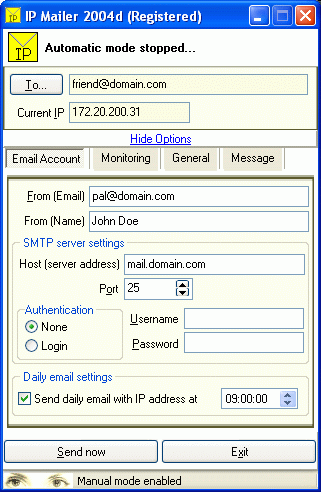
birdapplications
Источник: [https://torrent-igruha.org/3551-portal.html]What’s New in the 1st Mass Mailer Version: 3.1 serial key or number?
Screen Shot

System Requirements for 1st Mass Mailer Version: 3.1 serial key or number
- First, download the 1st Mass Mailer Version: 3.1 serial key or number
-
You can download its setup from given links:


